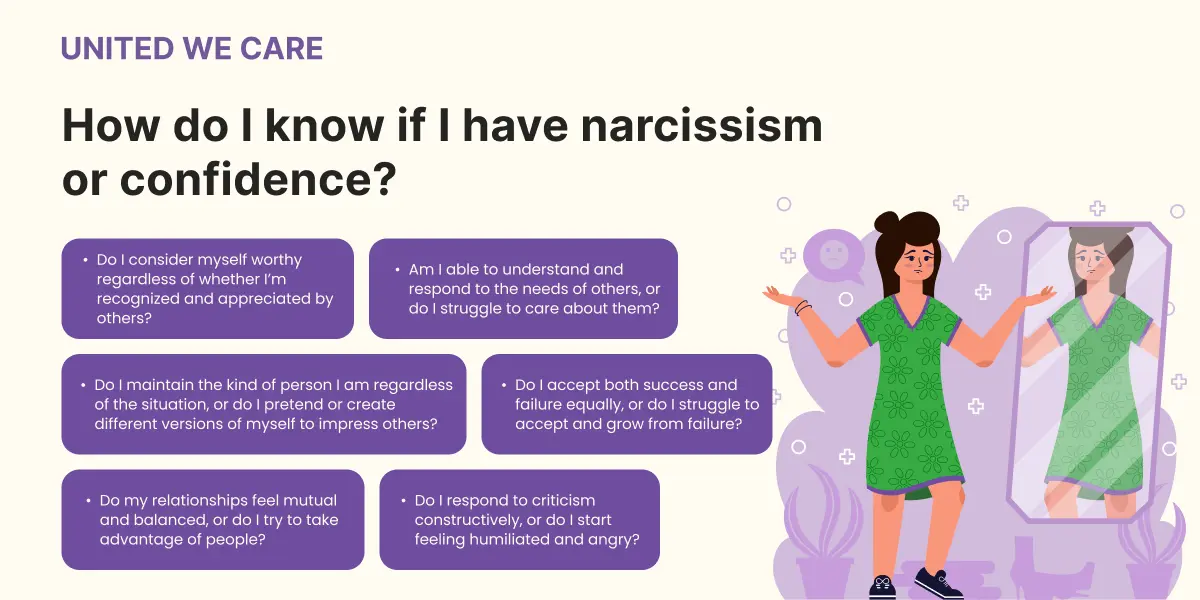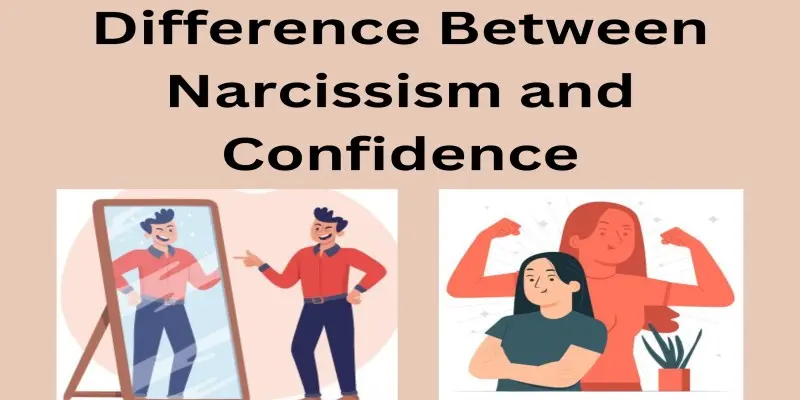Introduction
Being confident is a valuable trait. However, in this digital age where personal qualities are carefully crafted, it has become increasingly difficult to tell the difference between genuine and inauthentic confidence. So, what does being confident really mean? Confidence is the trust you have in your abilities, skills, judgment, or resources to navigate through any given situation. It is characterized by flexibility and resilience in adapting to changing life circumstances. You will most likely find a confident person taking charge of things or projects, being bold in social situations, and speaking their mind directly and assertively. However, you will also find a narcissist displaying similar qualities. Hence, it is important to understand the difference between narcissism and confidence for a better quality of your relationships and well-being.
What is narcissism?
The term narcissism comes from the Greek myth of Narcissus, a man who fell obsessively in love with his own reflection and suffered an ill fate due to it.
Clinically speaking, a narcissistic person will have an extreme preoccupation with their own self, needs, and desires, much to the ignorance of everything and everyone else.
Narcissism may include healthy traits such as confidence and self-regard. However, when taken to an extreme, they can manifest as a sense of entitlement, seeking excessive attention and admiration from others and not having much empathy or consideration for them.
When this kind of behavior is exhibited long-term, it may become a disorder, i.e., Narcissistic Personality Disorder (NPD). Individuals diagnosed with NPD can be uncooperative, selfish, and abusive.[1]
Narcissistic tendencies may be caused by genetics, childhood and attachment trauma, and differences in brain chemistry and structure.
Differences between narcissism and confidence
While narcissism and confidence may, at times, seem similar, there are major differences between the two, primarily in terms of where these behaviors stem from, the motivation behind them, and their impact on others.
The origin and development of the behavior
Confidence comes from knowing your own abilities accurately, having faced challenges and overcome them, and experiencing achievement. It is realistic since it develops from first-hand life experiences. Narcissism, on the other hand, can be a result of dysfunctional childhood experiences such as extremely high expectations, abuse, or neglect. You might develop narcissistic traits as a coping mechanism to protect your fragile sense of self.
The motivation behind behavior and the basis of self-esteem
Genuine confidence comes from a strong sense of self within and experiences with achievement. Narcissists often require external validation and approval from others to keep them going. This is why confident people are able to enjoy their successes and learn from their failures, whereas narcissists inflate their successes and are not able to accept their failures gracefully.[2]
Level of empathy and effect on relationships
Confident people are empathetic and can consider the perspectives of others. Hence, they’re able to form genuine connections with people where everyone feels valued. Narcissistic people lack empathy and often manipulate and exploit people. For them, the relationship is mostly about their benefit, and hence, their relationships with others are dysfunctional.
How they respond to criticism
Confident people can take criticism as a stepping stone and use it for their improvement without feeling insecure about their abilities. Narcissistic individuals, when criticised, often become defensive and angry. Criticism, even if constructive, is a blow to their self-esteem since it’s mainly dependent on external validation.
Hence, the core attributes of confidence and narcissism are quite different. Confidence is a healthy and constructive behaviour that can help you grow yourself and your relationships, whereas narcissism is self-serving and can damage your relationships and well-being.
How do I know if I have narcissism or confidence?
The first step to determining whether you are narcissistic or merely confident is self-awareness. And if you are questioning this, it may be a good sign since narcissistic people cannot often reflect on their behavior. In contrast, confident people are curious and willing to work on themselves. To create more awareness about your behavior, you can reflect on the following questions:

- Do I consider myself worthy regardless of whether I’m recognized and appreciated by others?
- Do I respond to criticism constructively, or do I start feeling humiliated and angry?
- Am I able to understand and respond to the needs of others, or do I struggle to care about them?
- Do my relationships feel mutual and balanced, or do I try to take advantage of people?
- Do I accept both success and failure equally, or do I struggle to accept and grow from failure?
- Do I maintain the kind of person I am regardless of the situation, or do I pretend or create different versions of myself to impress others?
If you reflect on these questions and find that you’re leaning more towards narcissistic tendencies, you can begin by acknowledging this and then working on improving yourself.
What should I do to overcome narcissism and regain confidence?
- As you begin creating self-awareness of your motivation and behavior, you must aim for personal improvement and adopt a growth mindset.
- Understanding and accepting failure as an equal part of the learning process can help you shift from a fixed mindset and open you up to new perspectives and opportunities.
- You can also practice listening to people actively to develop empathy towards their feelings and experiences.
- You must also evaluate the kind of relationships you have and would like to build in the future. If you want to build healthier relationships, you must start respecting and celebrating others.
- While you work on yourself, you may also seek the support of a mental health professional who can give you the tools and strategies to develop healthier patterns of thinking and relating to others.
- Cognitive behavioral therapy (CBT) has been proven to be especially effective in addressing this.[3]
Conclusion
Being confident can be one of the traits of a narcissistic personality. However, there is a significant difference between being genuinely confident and being narcissistic. These behaviors differ in terms of their origin and development, the motivation behind them, and their effect on relationships. If you find signs similar to narcissism in yourself or a loved one, you must reach out for professional support. At United We Care, we offer the most appropriate, clinically backed solutions for all your needs for well-being.
References:
[1] “Narcissistic Personality Disorder,” APA Dictionary of Psychology, American Psychological Association, https://dictionary.apa.org/narcissistic-personality-disorder. Accessed: Nov. 8, 2023
[2] David R. Collins, Arthur A. Stukas, Narcissism and self-presentation: The moderating effects of accountability and contingencies of self-worth, Journal of Research in Personality, Volume 42, Issue 6, 2008, Pages 1629-1634, ISSN 0092-6566, https://doi.org/10.1016/j.jrp.2008.06.011. Accessed: Nov. 8, 2023
[3] Kealy, D., Goodman, G., Rasmussen, B., Weideman, R., & Ogrodniczuk, J. S. (2017). Therapists’ perspectives on optimal treatment for pathological narcissism. Personality Disorders: Theory, Research, and Treatment, 8(1), 35–45. https://doi.org/10.1037/per0000164. Accessed: Nov. 8, 2023





